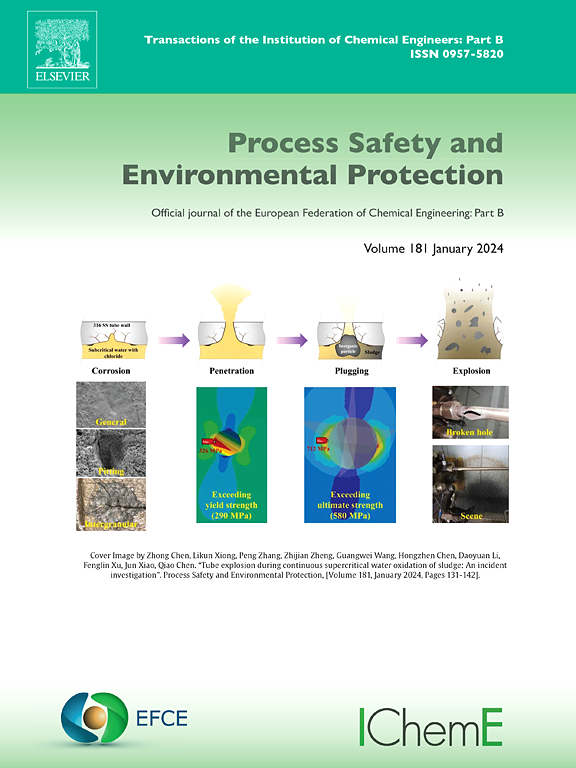探索石墨烯基催化剂在生物柴油生产中的潜力:机理、合成、推广、性能、产品质量和环境可持续性的综合综述
IF 7.8
2区 环境科学与生态学
Q1 ENGINEERING, CHEMICAL
引用次数: 0
摘要
随着对可持续能源需求的增长,需要更高效的生物柴油生产工艺。石墨烯基材料由于其独特的特性,包括高表面积和催化活性,已经成为高性能和可改性的催化剂。本文综述了促进石墨烯材料,包括还原氧化石墨烯、金属氧化物支撑石墨烯、功能化石墨烯和石墨烯基复合材料,它们是酯化和酯交换反应的优良催化剂。综述了不同石墨烯基催化剂的反应机理,包括酸性、碱性和双功能催化剂。本文综述了反应条件对石墨烯基催化剂性能的重要影响,包括催化剂负载、温度、醇油摩尔比、时间和搅拌速度。最重要的是,所生产的生物柴油始终符合国际热物理性能质量标准,与石油柴油相比,具有显著的环保优势。最终,正如本文所述,石墨烯催化生物柴油生产的进步,极大地促进了全球对更高效和可持续的能源解决方案的持续努力。这个令人兴奋和充满活力的领域为未来的研究者提供了完美的潜力。本文章由计算机程序翻译,如有差异,请以英文原文为准。
Exploring the potential of graphene-based catalysts for biodiesel production: A comprehensive review of mechanisms, synthesis, promotion, performance, product quality, and environmental sustainability
As the demand for sustainable energy sources grows, there is a need for more efficient and effective biodiesel production processes. Graphene-based materials have emerged as capable and modifiable catalysts due to their unique features, including high surface area and catalytic activity. This review explored the promoted graphene materials, comprising reduced graphene oxide, metal oxide-supported graphene, functionalized graphene, and graphene-based composites, that render them excellent catalysts for the esterification and transesterification reactions. An overview of the reaction mechanisms of different graphene-based catalysts, including acidic, basic, and bi-functional catalysts, is presented. This review exhibits the crucial effect of reaction conditions, including catalyst loadings, temperature, alcohol to oil mole proportion, time, and stirring speed, on the performance of graphene-based catalysts. Crucially, the produced biodiesel consistently meets international quality standards for thermophysical properties and offers significant environmental advantages over petroleum diesel. Ultimately, the advancements in graphene-based catalysis for biodiesel production, as reviewed herein, significantly contribute to the ongoing global efforts toward more efficient and sustainable energy solutions. This exciting and dynamic field possesses perfect potential for future researchers.
求助全文
通过发布文献求助,成功后即可免费获取论文全文。
去求助
来源期刊

Process Safety and Environmental Protection
环境科学-工程:化工
CiteScore
11.40
自引率
15.40%
发文量
929
审稿时长
8.0 months
期刊介绍:
The Process Safety and Environmental Protection (PSEP) journal is a leading international publication that focuses on the publication of high-quality, original research papers in the field of engineering, specifically those related to the safety of industrial processes and environmental protection. The journal encourages submissions that present new developments in safety and environmental aspects, particularly those that show how research findings can be applied in process engineering design and practice.
PSEP is particularly interested in research that brings fresh perspectives to established engineering principles, identifies unsolved problems, or suggests directions for future research. The journal also values contributions that push the boundaries of traditional engineering and welcomes multidisciplinary papers.
PSEP's articles are abstracted and indexed by a range of databases and services, which helps to ensure that the journal's research is accessible and recognized in the academic and professional communities. These databases include ANTE, Chemical Abstracts, Chemical Hazards in Industry, Current Contents, Elsevier Engineering Information database, Pascal Francis, Web of Science, Scopus, Engineering Information Database EnCompass LIT (Elsevier), and INSPEC. This wide coverage facilitates the dissemination of the journal's content to a global audience interested in process safety and environmental engineering.
 求助内容:
求助内容: 应助结果提醒方式:
应助结果提醒方式:


